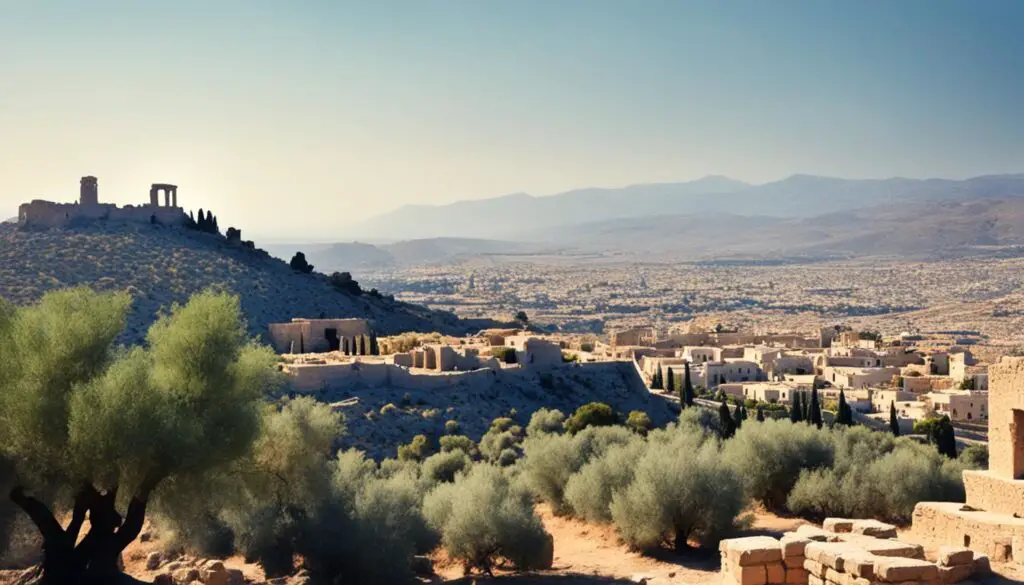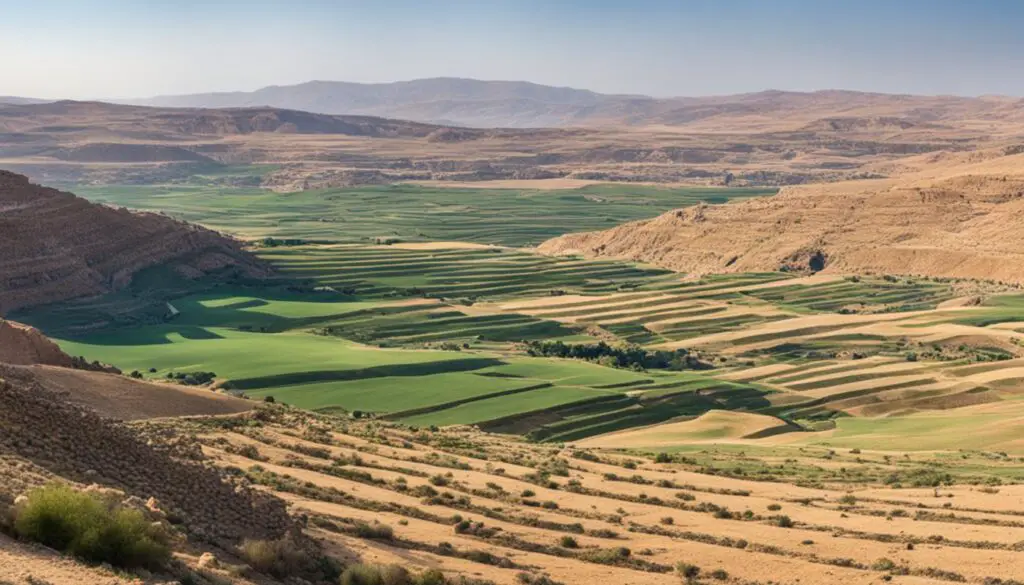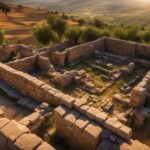Ophrah, a name mentioned in the Bible, holds significant meaning and historical importance within the context of biblical narratives. It refers to two different locations, each with its own unique relevance. One Ophrah is a locality in the territory of the tribe of Benjamin near Beth-El, which experienced attacks by Philistine “spoilers” before the battle of Michmas. This Ophrah later became the capital of a district ceded by Samaria to Judea. The other Ophrah was the hometown of Gideon, a hero called by God to fight against the Midianites and rule until his death.
The biblical references to Ophrah provide insights into its identity, historical significance, and geographical location. The exact whereabouts of Gideon’s Ophrah are uncertain, with possibilities in the vicinity of Mt. Tabor and the Jezreel Valley. Understanding the context and events associated with Ophrah helps to unravel its profound impact on the biblical narrative.
Key Takeaways:
- Ophrah is mentioned in the Bible, representing two different locations with historical and religious significance.
- One Ophrah is situated near Beth-El in the tribe of Benjamin, while the other is the hometown of Gideon.
- Ophrah witnessed conflicts between the Israelites and the Philistines, highlighting the ongoing struggle of good versus evil.
- Gideon’s calling and rule in Ophrah emphasize themes of faith, obedience, and divine intervention.
- The exact location of Gideon’s Ophrah remains uncertain, but ongoing excavations provide valuable insights into the ancient cultures and peoples of the region.
Ophrah’s Historical Significance
Ophrah holds a significant place in the history of the Old Testament. It played a crucial role in several key events, leaving a lasting impression on the biblical narrative.
One noteworthy event was the attack on Ophrah by Philistine “spoilers” before the battle of Michmas. This incident marked a significant moment in the ongoing conflict between the Israelites and the Philistines, showcasing the strategic importance of Ophrah.
Another significant aspect of Ophrah’s history is its connection to the life of Gideon. Gideon, who hailed from this location, was called by God to lead the fight against the Midianites. Ophrah served as the base from which Gideon rallied his troops, showcasing its symbolic and strategic importance in the battle against oppression.
Ophrah’s historical significance is deeply intertwined with its role in the Old Testament. The events that unfolded in this ancient city have shaped the narrative of the Bible and contributed to the larger historical context of the time.
Key Historical Events in Ophrah
| Event | Significance |
|---|---|
| Attack by Philistine “spoilers” | Highlights the ongoing conflict between Israelites and Philistines |
| Gideon’s calling and leadership | Showcases the divine intervention and the power of faith |
Table: Key Historical Events in Ophrah and their Significance
In conclusion, Ophrah’s historical significance in the Old Testament cannot be overstated. It served as the backdrop for pivotal events, leaving a lasting impact on the biblical narrative and providing valuable insights into the historical context of the time.
Ophrah’s Geographical Location
Ophrah is mentioned as a place near Beth-El in Benjamin’s territory. It is identified with the modern-day site of al-Ṭayyiba, located about 4 miles northeast of Beth-El. The exact location of Gideon’s Ophrah, however, remains uncertain. Scholars suggest possibilities in the vicinity of Mt. Tabor and the Jezreel Valley, but definitive identification is challenging.
| Location | Description |
|---|---|
| Ophrah near Beth-El | A place mentioned in the Bible, located about 4 miles northeast of Beth-El. Identified with the modern-day site of al-Ṭayyiba. |
| Gideon’s Ophrah | The exact location remains uncertain, with possibilities near Mt. Tabor and the Jezreel Valley. Definitive identification is challenging. |
“The geographical location of Ophrah is a subject of debate among scholars. While the Ophrah near Beth-El has been more clearly identified with the modern-day site of al-Ṭayyiba, the location of Gideon’s Ophrah remains uncertain. Various possibilities in the vicinity of Mt. Tabor and the Jezreel Valley have been proposed, but a conclusive identification has yet to be determined.”

Archaeological Discoveries in Ophrah
While there is limited information available on archaeological discoveries specifically related to Ophrah, ongoing excavations in the regions corresponding to its possible locations continue to shed light on the historical context of the biblical narrative. These findings in Ophrah contribute to our understanding of the ancient cultures and peoples that once inhabited the areas associated with Ophrah.
Although the exact location of Gideon’s Ophrah remains uncertain, archaeological research in the vicinity of Mount Tabor and the Jezreel Valley has revealed significant insights into the history and way of life during biblical times.
“Through careful excavation and analysis, archaeologists have unearthed artifacts and structures that offer glimpses into the daily lives of the people who lived in and around Ophrah. These findings provide valuable clues about their customs, traditions, and religious practices.”
Among the notable discoveries are pottery fragments, stone tools, and remains of dwellings, which indicate the presence of a settled community in the region. These findings help paint a clearer picture of the ancient inhabitants of Ophrah and their material culture.
Excavation Highlights:
- Discovery of a well-preserved ancient oil lamp with intricate designs, suggesting local craftsmanship and artistic expression.
- Unearthed burial sites containing ossuaries and burial objects, shedding light on burial practices and beliefs of the time.
- Evidence of agricultural techniques, including terraced fields and irrigation systems, illustrating the significance of agriculture in the region.
While these archaeological discoveries in Ophrah are still ongoing and require further analysis, they contribute to the broader understanding of biblical Ophrah and provide valuable insights into the lives of the ancient inhabitants of the area.
Theological Themes in Ophrah
Ophrah holds theological importance in the Bible as it is connected to significant events and individuals in the religious narrative. The battles fought in and near Ophrah symbolize the ongoing struggle between good and evil, as well as the divine intervention in human affairs.
Gideon’s experiences in Ophrah emphasize themes of faith, obedience, and the role of individuals in God’s plan. It was in Ophrah that Gideon was called by God to lead the Israelites against the Midianites. Despite his initial doubts, Gideon exhibited unwavering faith and obedience. Through miracles and divine signs, Gideon emerged victorious, demonstrating the power of God’s guidance in the face of overwhelming odds.
“The Lord said to him, ‘Go in the strength you have and save Israel out of Midian’s hand. Am I not sending you?'”
– Judges 6:14
The story of Gideon in Ophrah serves as a powerful reminder of the role individuals play in fulfilling God’s plans. It highlights the importance of trusting in divine guidance, even when faced with uncertainty and challenges. Gideon’s experiences in Ophrah reinforce the theological principle that with faith and obedience, God can use individuals to accomplish great things.
In addition to Gideon’s story, Ophrah’s theological themes extend to the broader narrative of the Bible. The battles fought in and near Ophrah reveal the ongoing struggle between good and evil, underscoring the larger spiritual battle encompassing all of humanity. The location of these battles, Ophrah, serves as a symbolic representation of the spiritual warfare taking place in the world.
Moreover, Ophrah’s connection to significant events and individuals demonstrates the divine intervention in human affairs. It highlights the belief that God actively engages with humanity, shaping history and guiding His people towards His purposes. Ophrah’s theological themes provide insight into the spiritual significance of the location and its role within the overarching religious context.
| Key Theological Themes in Ophrah |
|---|
| 1. Faith and obedience in God’s plan |
| 2. The ongoing struggle between good and evil |
| 3. Divine intervention in human affairs |
| 4. The role of individuals in fulfilling God’s purposes |
By examining these theological themes in Ophrah, we gain a deeper understanding of the spiritual significance embedded in the biblical narrative. Ophrah’s connection to faith, obedience, and the ongoing struggle between good and evil reminds us of the timeless lessons and truths contained within the Bible.
Key Biblical Events in Ophrah
Ophrah, mentioned in the Old Testament, was a witness to several significant events that shaped the biblical narrative. Let’s explore two key moments that took place in Ophrah:
The Battle of Michmas
Before the battle of Michmas, Ophrah was attacked by Philistine “spoilers”, marking a momentous conflict between the Israelites and the Philistines. This conflict played a crucial role in the ongoing struggle for land and power in ancient times.
Gideon’s Heroic Battle
Ophrah was also renowned as the hometown of Gideon, a prominent figure in biblical history. Gideon was called by God to lead the Israelites against the Midianites. From Ophrah, he rallied his forces and embarked on a heroic battle, achieving victory with the help of divine intervention.

“The events that unfolded in Ophrah represent the triumph of the Israelites in their quest to establish their presence and uphold their faith. These key moments showcase the bravery, determination, and unwavering faith of those who fought in Ophrah.”
While these were not the only events that occurred in Ophrah, they hold particular significance in the biblical narrative. Ophrah’s historical contributions and its connection to these key events continue to resonate in religious and cultural contexts. As we delve further into the intriguing world of Ophrah, more layers of meaning and insights await us.
| Biblical Event | Significance |
|---|---|
| The Battle of Michmas | Conflict between Israelites and Philistines |
| Gideon’s Heroic Battle | Triumph of faith and divine intervention |
Cultural and Religious Practices in Ophrah
While specific cultural and religious practices in Ophrah are not extensively detailed in the biblical texts, it can be inferred that the people of Ophrah adhered to the wider cultural and religious customs of the Israelites during that time. These practices would have included rituals, sacrifices, and adherence to religious laws and commandments.
The Traditions of Ophrah
The traditions of Ophrah were rooted in the religious beliefs and customs of the Israelites. The people of Ophrah would have participated in various rituals and ceremonies that marked significant events and milestones in their lives. These traditions may have included but were not limited to:
- Sabbath Observance: The people of Ophrah would have observed the Sabbath, a day of rest and worship, as commanded in the Old Testament.
- Feasts and Festivals: Ophrah’s inhabitants might have celebrated the religious festivals and feasts outlined in the biblical texts, such as Passover, Pentecost, and the Feast of Tabernacles.
- Offerings and Sacrifices: The practice of offering sacrifices and offerings to God was an integral part of Israelite worship. Ophrah’s residents would have followed these customs, bringing their offerings to the designated places of worship.
- Circumcision: As a religious practice, male infants in Ophrah would likely have been circumcised in accordance with the covenant between God and Abraham described in the Bible.
“The people of Ophrah held steadfast to the traditions and religious customs passed down through generations. These practices reinforced their connection to their faith and the larger community of Israel.”
Although specific details regarding Ophrah’s cultural practices within the biblical texts may be limited, these broader religious customs provide insight into the religious life of Ophrah’s inhabitants and their commitment to observing their faith.

Prophetic and Eschatological Significance of Ophrah
Ophrah may not have a prominent role in prophetic or eschatological texts, but the events that unfolded in this ancient biblical location hold profound implications for future prophecies and eschatological themes. Particularly, Gideon’s calling and subsequent victory in Ophrah can be interpreted as a foreshadowing of significant events yet to come.
Throughout the Bible, Ophrah serves as a powerful reminder of divine guidance, faithfulness, and deliverance promised to God’s people. The triumph of Gideon over the Midianites showcases God’s ability to empower and protect His chosen ones in the face of overwhelming odds.
In the eschatological context, Ophrah’s significance lies in its representation of God’s sovereignty and His unwavering commitment to fulfilling His prophetic promises. The victorious outcome in Ophrah serves as a precursor to the ultimate triumph and fulfillment of God’s plans at the end of days.
As believers reflect on the events that transpired in Ophrah, they are encouraged to trust in God’s prophetic word, knowing that He remains faithful to His promises of redemption and restoration. Ophrah serves as a reminder that even in the midst of chaos and uncertainty, God’s plan for His people will ultimately prevail.

Key Points:
- Ophrah’s role in prophetic and eschatological texts is not prominent.
- Gideon’s calling and victory in Ophrah foreshadow future prophetic events.
- Ophrah symbolizes divine guidance, faithfulness, and deliverance in biblical narratives.
- The triumph in Ophrah reflects God’s sovereignty and His commitment to fulfilling prophetic promises.
- Ophrah inspires trust in God’s ultimate plan of redemption and restoration.
The Impact of Ophrah in the Bible
Ophrah’s significance is deeply woven into the biblical narrative through its connections to key events, influential individuals, and profound theological themes. The battles fought in Ophrah symbolize the eternal struggle between good and evil, showcasing the relentless fight against injustice and oppression. It is a testament to the resilience and unwavering spirit of the people of God.
One of the most prominent figures associated with Ophrah is Gideon. His calling and rule over Israel from Ophrah illuminate essential aspects of faith and obedience. Gideon’s story reminds us of the power of trusting in God’s guidance and the imperative of responding to divine calls, no matter how daunting they may seem. His victory over the Midianites, achieved through unconventional means, showcases the transformative impact that a single individual can have when empowered by God’s strength.
“The Lord said to him, ‘Go in the strength you have and save Israel out of Midian’s hand. Am I not sending you?'” – Judges 6:14
Moreover, the location of Ophrah itself holds immense significance as a reminder of God’s presence and intervention in the lives of His people. It serves as a beacon of hope and a testament to the miracles that unfold when we align ourselves with His divine purpose. Ophrah’s mention in the Bible extends far beyond its historical and geographical context, reverberating throughout the entire biblical narrative and influencing our understanding of God’s plan for humanity.
Through its rich symbolism, Ophrah encourages us to reflect on the impact of our actions, the importance of faithfulness, and the profound ways in which God can use ordinary individuals to bring about extraordinary change. As we delve deeper into the biblical texts, Ophrah’s legacy continues to inspire us and emphasize the transformative power of God’s presence and intervention in our lives.

| Key Points | Summary |
|---|---|
| Ophrah’s symbolizes the struggle between good and evil | Reflects the ongoing battle against injustice and oppression |
| Gideon’s calling and rule showcase faith and obedience | Highlights the transformative power of God’s guidance |
| The location of Ophrah signifies God’s presence and intervention | Reminds us of His divine involvement in our lives |
| Ophrah’s significance extends beyond its historical context | Influences the overall biblical narrative and themes |
Conclusion
Ophrah in the Bible holds significant historical, cultural, theological, and symbolic importance. Its association with key events, connections to important figures, and exploration of themes such as faith and divine guidance contribute to the overall narrative of the Bible. Despite uncertainties surrounding specific details about Ophrah, its mention in the biblical texts leaves a lasting impact on readers, offering valuable insights into the historical and spiritual context of the time.
Throughout the Old Testament, Ophrah played a pivotal role in battles between the Israelites and the Philistines, serving as a backdrop for the ongoing struggle between good and evil. Additionally, the story of Gideon and his calling from Ophrah exemplifies the importance of faith and obedience in fulfilling God’s plan.
While the exact location of Ophrah remains uncertain, the symbolic significance of this biblical place endures. Ophrah serves as a reminder of God’s presence, intervention, and the fulfillment of divine promises. Its mention in the Bible provides readers with a deeper understanding of the historical and spiritual context of the ancient Israelites and the overarching message of faith and deliverance woven throughout the scriptures.







